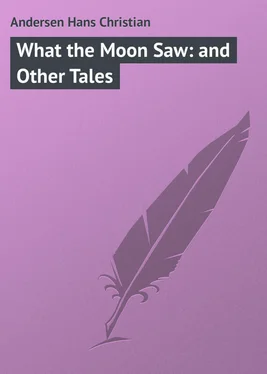Andersen Hans - What the Moon Saw - and Other Tales
Здесь есть возможность читать онлайн «Andersen Hans - What the Moon Saw - and Other Tales» — ознакомительный отрывок электронной книги совершенно бесплатно, а после прочтения отрывка купить полную версию. В некоторых случаях можно слушать аудио, скачать через торрент в формате fb2 и присутствует краткое содержание. Жанр: foreign_prose, на английском языке. Описание произведения, (предисловие) а так же отзывы посетителей доступны на портале библиотеки ЛибКат.
- Название:What the Moon Saw: and Other Tales
- Автор:
- Жанр:
- Год:неизвестен
- ISBN:нет данных
- Рейтинг книги:5 / 5. Голосов: 1
-
Избранное:Добавить в избранное
- Отзывы:
-
Ваша оценка:
- 100
- 1
- 2
- 3
- 4
- 5
What the Moon Saw: and Other Tales: краткое содержание, описание и аннотация
Предлагаем к чтению аннотацию, описание, краткое содержание или предисловие (зависит от того, что написал сам автор книги «What the Moon Saw: and Other Tales»). Если вы не нашли необходимую информацию о книге — напишите в комментариях, мы постараемся отыскать её.
What the Moon Saw: and Other Tales — читать онлайн ознакомительный отрывок
Ниже представлен текст книги, разбитый по страницам. Система сохранения места последней прочитанной страницы, позволяет с удобством читать онлайн бесплатно книгу «What the Moon Saw: and Other Tales», без необходимости каждый раз заново искать на чём Вы остановились. Поставьте закладку, и сможете в любой момент перейти на страницу, на которой закончили чтение.
Интервал:
Закладка:
"May there be joy in the room, and under the green boughs," said the Ruler of the Year. In a few weeks he had become a very old man, white as snow. "My time for rest draws near, and the young pair of the year shall now receive my crown and sceptre."
"But the might is still thine," said the Angel of Christmas; "the might and not the rest. Let the snow lie warmly upon the young seed. Learn to bear it, that another receives homage while thou yet reignest. Learn to bear being forgotten while thou art yet alive. The hour of thy release will come when spring appears."
"And when will spring come?" asked Winter.
"It will come when the stork returns."
And with white locks and snowy beard, cold, bent, and hoary, but strong as the wintry storm, and firm as ice, old Winter sat on the snowy drift on the hill, looking towards the south, where he had before sat and gazed. The ice cracked, the snow creaked, the skaters skimmed to and fro on the smooth lakes, ravens and crows contrasted picturesquely with the white ground, and not a breath of wind stirred. And in the quiet air old Winter clenched his fists, and the ice was fathoms thick between land and land.
Then the sparrows came again out of the town, and asked, "Who is that old man yonder?" And the raven sat there again, or a son of his, which comes to quite the same thing, and answered them and said, "It is Winter, the old man of last year. He is not dead, as the almanack says, but he is the guardian of Spring, who is coming."
"When will spring come?" asked the sparrows. "Then we shall have good times, and a better rule. The old one was worth nothing."
And Winter nodded in quiet thought at the leafless forest, where every tree showed the graceful form and bend of its twigs; and during the winter sleep the icy mists of the clouds came down, and the ruler dreamed of his youthful days, and of the time of his manhood; and towards the morning dawn the whole wood was clothed in glittering hoar frost. That was the summer dream of winter, and the sun scattered the hoar frost from the boughs.
"When will spring come?" asked the sparrows.
"The spring!" sounded like an echo from the hills on which the snow lay. The sun shone warmer, the snow melted, and the birds twittered, "Spring is coming!"
And aloft through the air came the first stork, and the second followed him. A lovely child sat on the back of each, and they alighted on the field, kissed the earth, and kissed the old silent man, and he disappeared, shrouded in the cloudy mist. And the story of the year was done.
"That is all very well," said the sparrows; "it is very beautiful too, but it is not according to the almanack, and therefore it is irregular."
SHE WAS GOOD FOR NOTHING
The mayor stood at the open window. His shirt-frill was very fine, and so were his ruffles; he had a breast-pin stuck in his frill, and was uncommonly smooth-shaven – all his own work; certainly he had given himself a slight cut, but he had stuck a bit of newspaper on the place. "Hark 'ee, youngster!" he cried.
The youngster in question was no other than the son of the poor washerwoman, who was just going past the house; and he pulled off his cap respectfully. The peak of the said cap was broken in the middle, for the cap was arranged so that it could be rolled up and crammed into his pocket. In his poor, but clean and well-mended attire, with heavy wooden shoes on his feet, the boy stood there, as humble and abashed as if he stood opposite the king himself.
"You're a good boy," said Mr. Mayor. "You're a civil boy. I suppose your mother is rinsing clothes down yonder in the river? I suppose you are to carry that thing to your mother that you have in your pocket? That's a bad affair with your mother. How much have you got in it?"
"Half a quartern," stammered the boy, in a frightened voice.
"And this morning she had just as much," the mayor continued.
"No," replied the boy, "it was yesterday."
"Two halves make a whole. She's good for nothing! It's a sad thing with that kind of people! Tell your mother that she ought to be ashamed of herself; and mind you don't become a drunkard – but you will become one, though. Poor child – there, go!"
Accordingly the boy went on his way. He kept his cap in his hand, and the wind played with his yellow hair, so that great locks of it stood up straight. He turned down by the street corner, into the little lane that led to the river, where his mother stood by the washing bench, beating the heavy linen with the mallet. The water rolled quickly along, for the flood-gates at the mill had been drawn up, and the sheets were caught by the stream, and threatened to overturn the bench. The washerwoman was obliged to lean against the bench, to support it.
"I was very nearly sailing away," she said. "It is a good thing that you are come, for I have need to recruit my strength a little. For six hours I've been standing in the water. Have you brought anything for me?"
The boy produced the bottle, and the mother put it to her mouth, and took a little.
"Ah, how that revives one!" she said: "how it warms! It is as good as a hot meal, and not so dear. And you, my boy! you look quite pale. You are shivering in your thin clothes – to be sure it is autumn. Ugh! how cold the water is! I hope I shall not be ill. But no, I shall not be that! Give me a little more, and you may have a sip too, but only a little sip, for you must not accustom yourself to it, my poor dear child!"
And she stepped up to the bridge on which the boy stood, and came ashore. The water dripped from the straw matting she had wound round her, and from her gown.
"I work and toil as much as ever I can," she said, "but I do it willingly, if I can only manage to bring you up honestly and well, my boy."
As she spoke, a somewhat older woman came towards them. She was poor enough to behold, lame of one leg, and with a large false curl hanging down over one of her eyes, which was a blind one. The curl was intended to cover the eye, but it only made the defect more striking. This was a friend of the laundress. She was called among the neighbours, "Lame Martha with the curl."
"Oh, you poor thing! How you work, standing there in the water!" cried the visitor. "You really require something to warm you; and yet malicious folks cry out about the few drops you take!" And in a few minutes' time the mayor's late speech was reported to the laundress; for Martha had heard it all, and she had been angry that a man could speak as he had done to a woman's own child, about the few drops the mother took: and she was the more angry, because the mayor on that very day was giving a great feast, at which wine was drunk by the bottle – good wine, strong wine. "A good many will take more than they need – but that's not called drinking. They are good; but you are good for nothing!" cried Martha, indignantly.
"Ah, so he spoke to you, my child?" said the washerwoman; and her lips trembled as she spoke. "So he says you have a mother who is good for nothing? Well, perhaps he's right, but he should not have said it to the child. Still, I have had much misfortune from that house."
"You were in service there when the mayor's parents were alive, and lived in that house. That is many years ago: many bushels of salt have been eaten since then, and we may well be thirsty;" and Martha smiled. "The mayor has a great dinner party to-day. The guests were to have been put off, but it was too late, and the dinner was already cooked. The footman told me about it. A letter came a little while ago, to say that the younger brother had died in Copenhagen."
"Died!" repeated the laundress – and she became pale as death.
"Yes, certainly," said Martha. "Do you take that so much to heart? Well, you must have known him years ago, when you were in service in the house."
Читать дальшеИнтервал:
Закладка:
Похожие книги на «What the Moon Saw: and Other Tales»
Представляем Вашему вниманию похожие книги на «What the Moon Saw: and Other Tales» списком для выбора. Мы отобрали схожую по названию и смыслу литературу в надежде предоставить читателям больше вариантов отыскать новые, интересные, ещё непрочитанные произведения.
Обсуждение, отзывы о книге «What the Moon Saw: and Other Tales» и просто собственные мнения читателей. Оставьте ваши комментарии, напишите, что Вы думаете о произведении, его смысле или главных героях. Укажите что конкретно понравилось, а что нет, и почему Вы так считаете.












